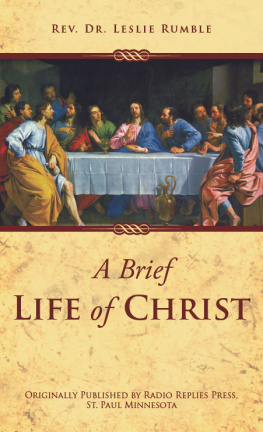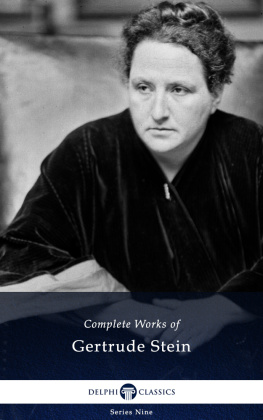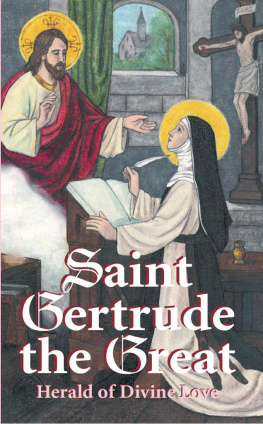

St. Gertrude the Great
c. 1256c.1302
Engraved from the miraculous Spanish painting.
Words of the Infant Jesus in St. Gertrudes heart:
In corde Gertrudis invenietis me
In the heart of Gertrude you shall find Me.
First published in English in 1862. Reprinted by Newman Press, Westminster, Maryland, in 1949, under the title The Life and Revelations of St. Gertrude . Reprinted by Christian Classics, Inc., Westminster, Maryland, in 1975, 1983, etc.
Retypeset from the 1987 Christian Classics printing and republished by TAN Books, an Imprint of Saint Benedict Press, LLC, in 2002, with a few translations of Latin phrases added in brackets.
Library of Congress Control No: 2001-132392
Cover design by Caroline Kiser.
Cover image: St. Gertrude the Great carrying the sacred heart of Jesus (oil on canvas), Spanish School, (17th century) / Monasterio de Santa Maria de San Salvador, Canas, Spain / The Bridgeman Art Library
ISBN: 978-0-89555-699-8
Printed and bound in the United States of America.
TAN Books
An Imprint of Saint Benedict Press, LLC
Charlotte, North Carolina
2012
OBLATION
I OFFER Thee this work, O Lord Jesus Christ, Fount of eternal light, in union with that ineffable charity which moved Thee, the Only-begotten of the Father, in the plenitude of the Divinity, to take upon Thee our nature, and to become Man. I offer it to Thee on the part of all Thy creatures, because it is Thine ineffable tenderness for mankind which caused Thee to pour forth those sweet and efficacious graces on the heart of Thy chosen spouse, to fructify them, to draw her to Thyself, and to unite her to Thee eternally.
I beseech Thee to take this work into Thy Divine keeping, that it may glorify the omnipotence of the Father, the wisdom of the Son and the love of the Holy Ghost. I offer it to Thee in fervent thanksgiving for all the graces which Thou hast communicated or wilt communicate through this work, even to the end of time. And as I am an utterly vile and unworthy creature, I offer Thee, in satisfaction for all my deficiencies and omissions, my blindness and ignorance, Thy own sweetest Heart, ever full of Divine thanksgiving and eternal beatitude. Amen.
LETTER OF THE RIGHT REV. DR. MORIARTY
T HE P ALACE , K ILLARNEY , D EC . 17 TH , 1870
My Dear Sister in Christ,
I learn that you are issuing some new Works, and some new editions of those already published. Your literary labours reflect honour on your Convent, on your Order, and on this Diocese.
But I rejoice much more in this, that you are contributing to supply one of our greatest needsa Catholic Literature. I know, too, that the funds realised by the sale of your works are exclusively devoted to the service of religion.
Praying God to bless you, and to preserve your health and strength,
Yours sincerely in Christ,
 D. Moriarty
D. Moriarty
T O S ISTER M. F RANCES C LARE ,
Convent of Poor Clares, Kenmare, Co. Kerry
INTRODUCTION
A Resume of the Well-Known Apologia of
T HERE is perhaps no Order in the Church which at once commands our admiration and wins our love like that of the great Order of St. Benedict. Even heresy has offered its poor meed of praise in attempting to transplant it to a foreign soil, and is fain to shelter its feeble imitation of religious life under the name of the great Patriarch of the West, claiming a patron in the Church, because none can be found outside its pale. It stands, like a primeval forest, by the great river Time its roots extending deep and wide, and forming an unshaken barrier to the ever-surging waves: its branches extending far and high, and affording shelter and protection in the wildest storms.
Peace and strength are the essential characteristics of its Rule and its children; prayer and love, the source and the support of these, its most manifest glories. And of this spirit St. Gertrude is the perfect realization; a Pax vobiscum is breathed into the soul in every revelation and in every action of that greatest of Saints. Her strength is the calm, beautiful strength of peace; for perfect peace alone can exist where the soul is stayed upon the Unchangeable, and thus can no longer be shaken by the transitory blasts which disturb the less perfect.
This work has been undertaken with feelings of no ordinary affection. There are few Orders in the Church which are not indebted in some degree to the Benedictine, but none more deeply than that of the poor one of Assisi, who found in the Benedictines his first and kindest supporters; and when his second Order was established, it was they who gave a temporary home and a holy example to the gentle Clare de Scefi and her young sister Agnes. We can scarcely turn over a page in the history of the Friars Minors or the Poor Clares without finding how this kindness has been continued and increased. May this offering to the great Order of St. Benedict be accepted by his devoted children as a humble though a poor return for their unwearied love!
A recent review of the Gertrudenbuch von P. Maurus Wolter , which is attributed to a Father of the Order, enters so fully into the peculiar merits and sanctity of St. Gertrude, that we cannot forbear an extract. Would that its eloquent and spiritual words had found a less ephemeral resting place than the pages in which it is inserted!
St. Gertrude, in the most extensive sense, was a daughter of the cloister. Officium and sacrificium , the Scriptures and the Liturgy, are the two wings by which pure souls fly to God in monastic life. The Missal and the Breviary are the two fountains of liturgical devotion from which they may draw the pure waters of life. These waters and those wings were well understood and appreciated in the Middle Ages; and in the sixty thousand convents which sent up praise to God, sicut incensum in conspectu ejus , during the lifetime of St. Gertrude, there was not one being who more fully grasped these two means of perfection, or turned them to greater advantage, than Our Saint. Through them she became the grosse Aebtissinn ; through them, directed by the tender, loving spirit of the Rule, she became the most perfect and striking exponent of the spirit of St. Benedict that can be found in the lives of the Saints of God.
Nor is he less eloquent in speaking of the great restorations, or rather, we should say, advancements, of his Order; of St. Martins, consecrated once more to its ancient uses, where, by the piety of the widowed Princess Catherine of Hohenzollern, the children of St. Benedict, with the special blessing of the Holy See, are leading lives of no ordinary fervor and devotedness, under the guidance of their holy Prior Dom Wolter; where the ancient and miraculous image of the Mother of Sorrows is venerated once more by thousands of devout pilgrimsand of Solesmes with its Abbot, whose European fame for learning is only equalled by his cloistral fame for sanctity; where sixty God-praising monks chanted together the Gregorian choral song in the curious old church of the monastery; where joyful obedience, brotherly love and studious attention to the never-wanting guest are beautifully combined with, and enhanced by, genuine and ardent zeal for ecclesiastical discipline and authority, with a devotion to literature, and an anxiety for its advancement, which can hardly be surpassed.
The history of the labors of Abbot Gueranger would almost require a volume. Perhaps his chiefest eternal fame, and his brightest reward, will be for the government of his monastery, the foundations he has effected and his persevering efforts, in the face of opposition which would have crushed any ordinary mind, in planting the Roman Liturgy in France, in place of that which at least bore a tincture of independence of the Holy See, and a trace of rationalism.
Next page













 D. Moriarty
D. Moriarty